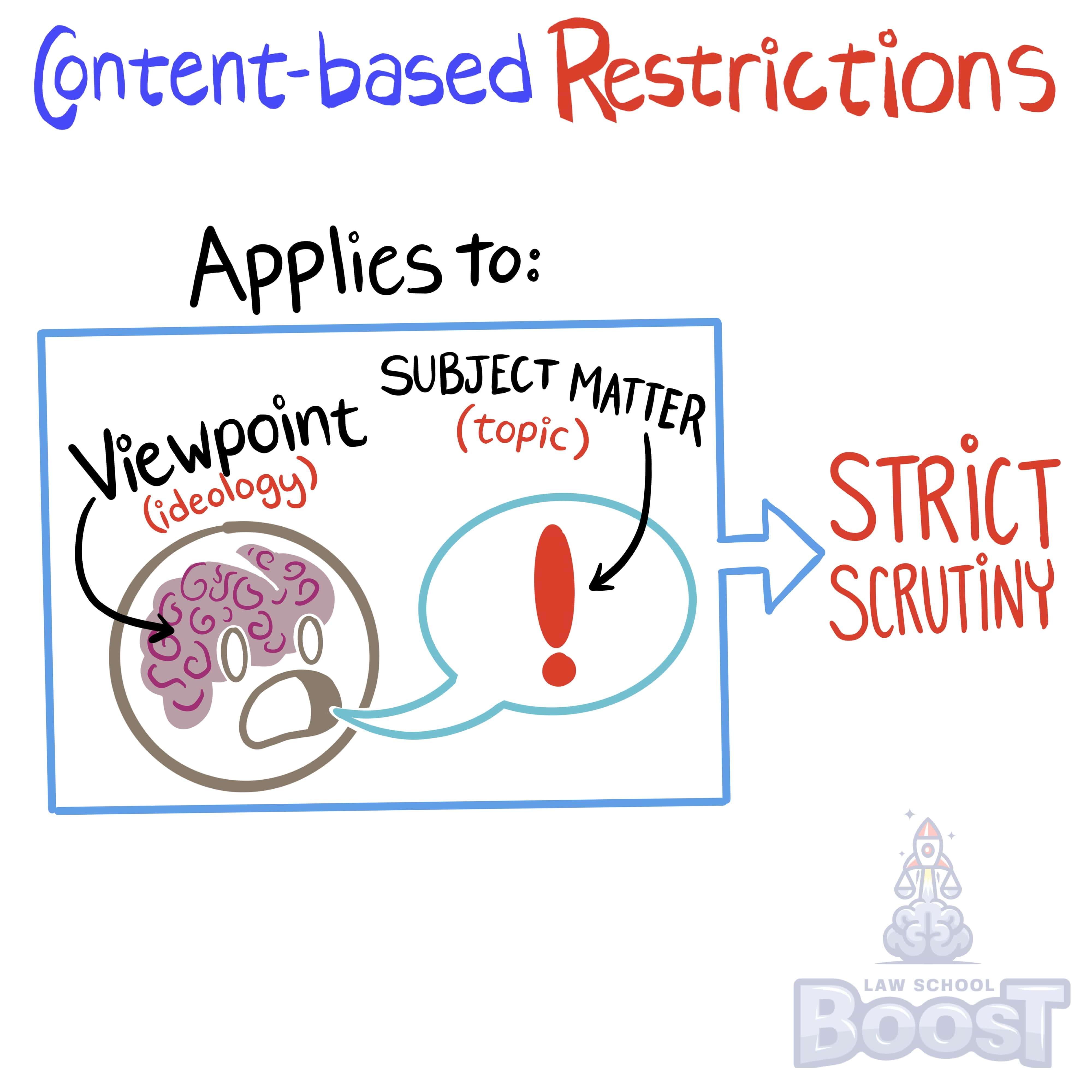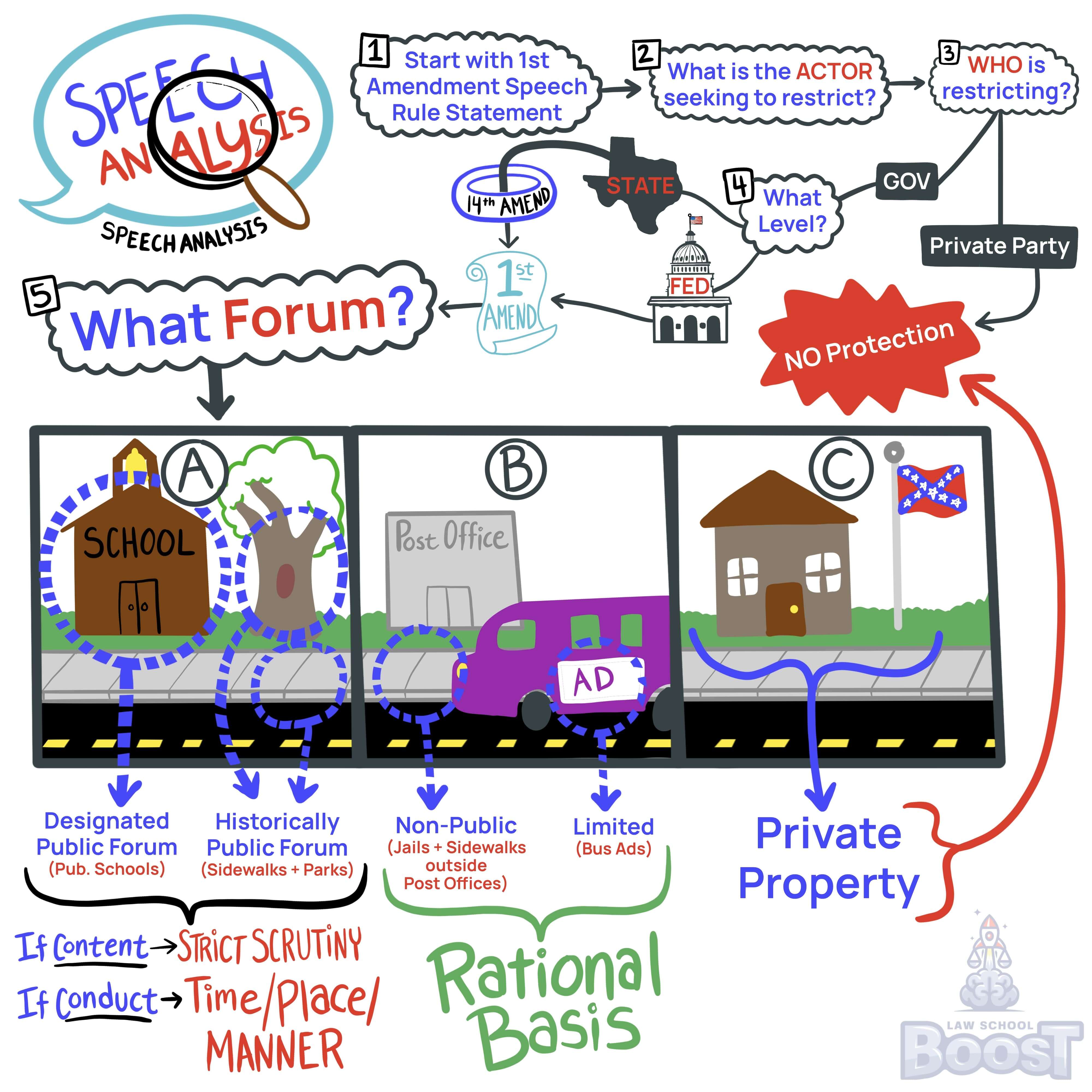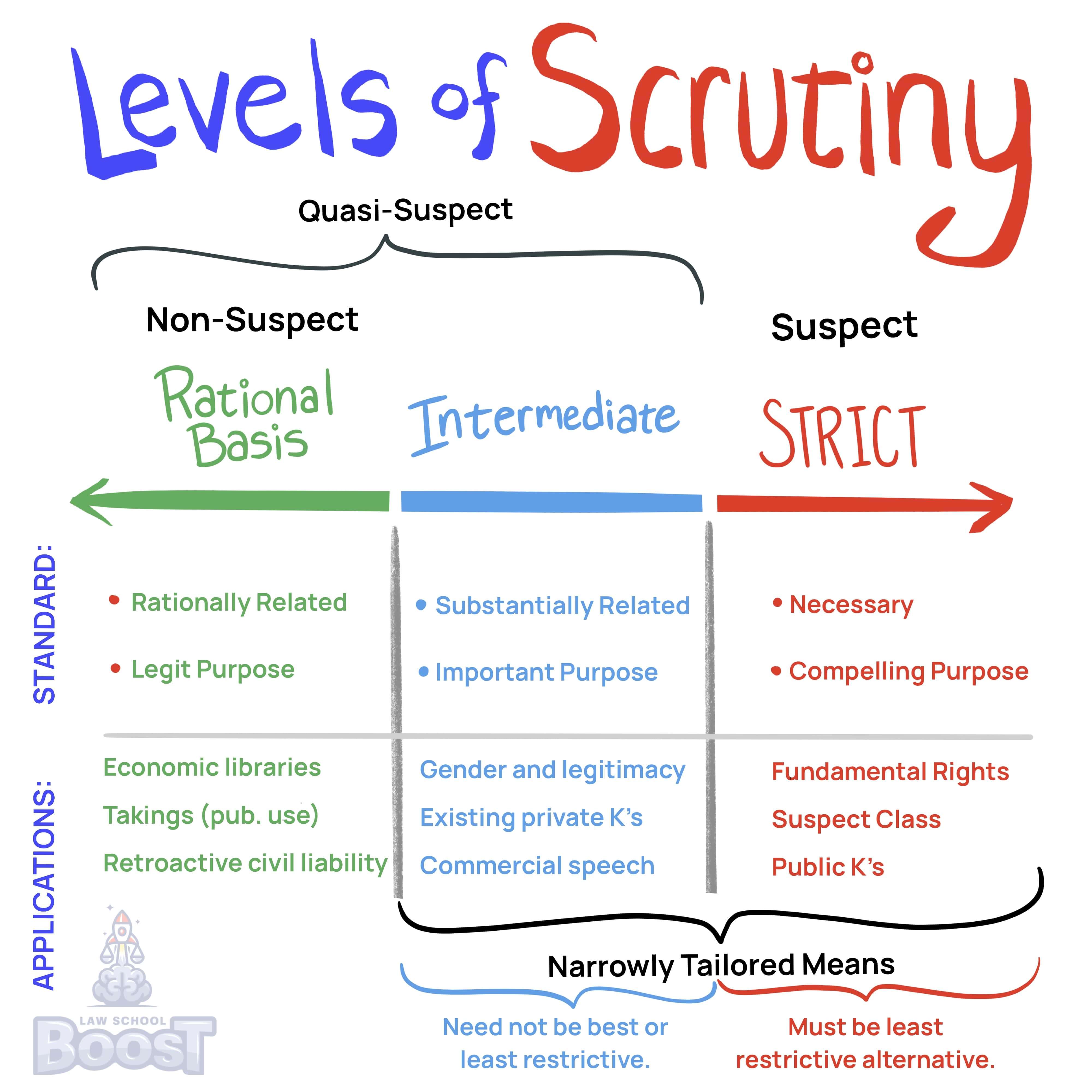🇺🇸
Constitutional Law • First Amendment - Free Speech
CONLAW#117
Legal Definition
Content-based restrictions are those that relate to the subject matter (topic) or viewpoint (ideology) of speech, and are subject to strict scrutiny.
Plain English Explanation
The First Amendment of the U.S. Constitution protects freedom of speech, which is a fundamental right in America. However, not all speech is treated equally under the law. The government can place some limits on speech, but the level of scrutiny (how closely the courts examine the restriction) varies depending on how the speech is being restricted.
Content-based restrictions are laws that restrict speech based on the subject matter or the viewpoint being expressed. For example, a law banning all political protests would be a content-based restriction because it targets speech based on the topic (politics). Similarly, a law allowing protests in support of the current government but banning protests against the government would be a viewpoint-based restriction.
Because these types of restrictions can easily be abused to censor unpopular opinions or criticism of the government, courts apply the highest level of scrutiny, known as "strict scrutiny", when evaluating their constitutionality. To pass strict scrutiny, the government must prove that the restriction is narrowly tailored to achieve a compelling state interest - in other words, there must be a really important reason for limiting this speech, and the law must be carefully designed to restrict as little speech as possible while still achieving that goal.
This high bar exists to protect open debate and the free exchange of ideas, which are essential to a functioning democracy. The rule ensures that the government cannot arbitrarily silence speech it doesn't like. While some limited content-based restrictions can be justified (like banning true threats of violence), in general the government must allow the expression of all topics and viewpoints, even controversial or unpopular ones.
Content-based restrictions are laws that restrict speech based on the subject matter or the viewpoint being expressed. For example, a law banning all political protests would be a content-based restriction because it targets speech based on the topic (politics). Similarly, a law allowing protests in support of the current government but banning protests against the government would be a viewpoint-based restriction.
Because these types of restrictions can easily be abused to censor unpopular opinions or criticism of the government, courts apply the highest level of scrutiny, known as "strict scrutiny", when evaluating their constitutionality. To pass strict scrutiny, the government must prove that the restriction is narrowly tailored to achieve a compelling state interest - in other words, there must be a really important reason for limiting this speech, and the law must be carefully designed to restrict as little speech as possible while still achieving that goal.
This high bar exists to protect open debate and the free exchange of ideas, which are essential to a functioning democracy. The rule ensures that the government cannot arbitrarily silence speech it doesn't like. While some limited content-based restrictions can be justified (like banning true threats of violence), in general the government must allow the expression of all topics and viewpoints, even controversial or unpopular ones.
Hypothetical
Hypo 1: The state of Hypofornia passes a law banning any public protests or rallies criticizing the governor's economic policies, claiming they could lead to violence. Sam opposes the governor's recent tax plan and wants to organize a peaceful march, but is told by police that his rally would be illegal under the new law. Result: This law would almost certainly be struck down as an unconstitutional content-based restriction on speech. The ban is based entirely on the topic (criticism of the governor's economic policies) and viewpoint (opposition to those policies) of the speech. While preventing violence is a compelling state interest, banning all critical speech on this topic is not narrowly tailored to that interest, especially since Sam is planning a peaceful rally. The law essentially censors an entire political viewpoint, which violates the core of the First Amendment.
Hypo 2: Hypofornia enacts a statute prohibiting any speech on state college campuses that "defames or insults" any racial or ethnic group. A student group led by Sam wants to bring a controversial conservative speaker to campus who has made statements harshly criticizing illegal immigration and claiming that Mexican immigrants are "invading" the country. The college denies their request, saying the speech would violate the defamation law. Result: This law and the college's actions would violate the First Amendment. The restriction is clearly content-based, as it bans speech related to race and ethnicity that is deemed offensive or insulting. Even if avoiding racial discord is a compelling interest, this blanket ban on insults and "defamation" (which implies false statements, not just offensive ones) is far too broad. It would censor huge amounts of speech, including core political speech on issues like immigration, and is not the least restrictive means to pursue that interest. Offensive speech is still constitutionally protected.
Hypo 3: The city of Hypovia passes an ordinance banning public nudity citywide. Bob wants to hold a nude protest against the mayor but is told he will be arrested if he does so. Result: This law would likely be upheld as constitutional. While it does restrict expressive conduct (the nude protest), the restriction is not based on the content of that expression. The ban on nudity applies regardless of the subject matter or viewpoint of the proposed nude speech. Public nudity bans are justifiable under a lower level of scrutiny as a content-neutral regulation of the time, place and manner of speech. The city has a substantial interest in public order, morality and cleanliness that justifies a ban on nudity, and the law still leaves ample alternative channels for Bob to express his criticisms of the mayor.
Hypo 4: New Hypoland enacts a law banning the sale of any video games containing graphic violence against human characters. Game stores owned by Bob and Sam challenge the law as violating their free speech rights. Result: This law raises serious First Amendment issues as a content-based restriction on protected speech (video games have been held to be speech by the Supreme Court). The state would have to prove a compelling interest (like preventing real-world violence) that justifies singling out video game violence compared to violence in other media. And the law would have to be proven to actually help achieve that interest and be the least restrictive means to do so. Given the lack of clear evidence linking video games to real violence, a court would likely find this an overinclusive law that unconstitutionally restricts speech based on its violent content.
Hypo 2: Hypofornia enacts a statute prohibiting any speech on state college campuses that "defames or insults" any racial or ethnic group. A student group led by Sam wants to bring a controversial conservative speaker to campus who has made statements harshly criticizing illegal immigration and claiming that Mexican immigrants are "invading" the country. The college denies their request, saying the speech would violate the defamation law. Result: This law and the college's actions would violate the First Amendment. The restriction is clearly content-based, as it bans speech related to race and ethnicity that is deemed offensive or insulting. Even if avoiding racial discord is a compelling interest, this blanket ban on insults and "defamation" (which implies false statements, not just offensive ones) is far too broad. It would censor huge amounts of speech, including core political speech on issues like immigration, and is not the least restrictive means to pursue that interest. Offensive speech is still constitutionally protected.
Hypo 3: The city of Hypovia passes an ordinance banning public nudity citywide. Bob wants to hold a nude protest against the mayor but is told he will be arrested if he does so. Result: This law would likely be upheld as constitutional. While it does restrict expressive conduct (the nude protest), the restriction is not based on the content of that expression. The ban on nudity applies regardless of the subject matter or viewpoint of the proposed nude speech. Public nudity bans are justifiable under a lower level of scrutiny as a content-neutral regulation of the time, place and manner of speech. The city has a substantial interest in public order, morality and cleanliness that justifies a ban on nudity, and the law still leaves ample alternative channels for Bob to express his criticisms of the mayor.
Hypo 4: New Hypoland enacts a law banning the sale of any video games containing graphic violence against human characters. Game stores owned by Bob and Sam challenge the law as violating their free speech rights. Result: This law raises serious First Amendment issues as a content-based restriction on protected speech (video games have been held to be speech by the Supreme Court). The state would have to prove a compelling interest (like preventing real-world violence) that justifies singling out video game violence compared to violence in other media. And the law would have to be proven to actually help achieve that interest and be the least restrictive means to do so. Given the lack of clear evidence linking video games to real violence, a court would likely find this an overinclusive law that unconstitutionally restricts speech based on its violent content.
Visual Aids



Related Concepts
Are fighting words protected speech?
Are profane and indecent speech protected?
Can government speech be challenged?
How do you analyze a free speech issue?
Is anonymous speech protected?
Is discretion allowed in determining fees for public demonstrations?
Is speech protected when it incites illegal activity?
May the government seize assets of businesses that violate obscenity laws?
What are designated public forums?
What are limited public forums?
What are non-public forums?
What are prior restraints and when are they valid?
What are public forums?
What are the limits of free speech during a broadcast?
What does the 1st Amendment prohibit, and how is it applied?
What is the 1st Amendment right to access private property for speech?
What is the constitutionality of laws prohibiting group discrimination?
What level of scrutiny is applied to content-based restrictions on public forums?
What level of scrutiny is applied to court orders suppressing speech?
What level of scrutiny is applied to laws impacting freedom of association?
What level of scrutiny is applied to laws that require disclosure of group membership?
What rights do the press have in addition to those granted to private citizens?
When are obscenities and sexually oriented speech considered obscene?
When are time, place, and manner restrictions on speech valid?
When is a law unconstitutionally overbroad?
When is a law unconstitutionally vague?
When is commercial speech protected, and when is it not?
When is speech by government employees not protected?
When may a private figure recover for defamation if there is no matter of public concern?
When may a private figure recover for defamation regarding a matter of public concern?
When may a public official or figure recover for defamation?
When may the government ban child pornography?
When may the government burden lawful, non-misleading, non-fraudulent commercial speech?
When may the government punish or limit news reporting?
When may the government punish private possession of obscene materials?
When may the government regulate symbolic speech?
When may the government require a license for speech?
When may the government use zoning ordinances to regulate adult businesses?
Which level of scrutiny is applied to content-neutral restrictions?


